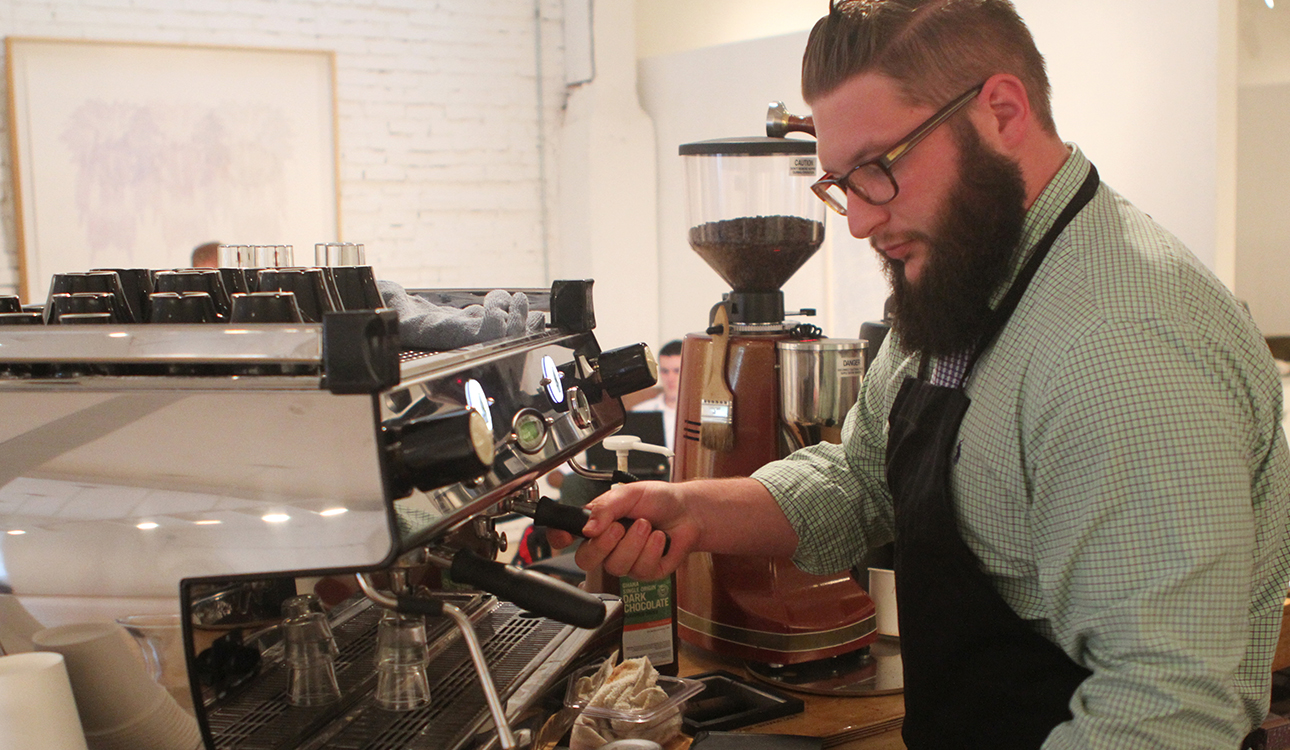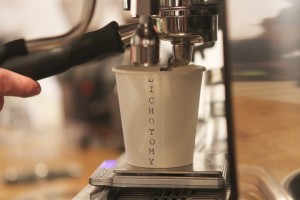

Reporter
Many people will pull up to a drive-through window at McDonald’s and order a McCafe Frappe Mocha in order to treat themselves or a get a caffeine boost. Coffee shops in Waco, however, believe that they’re offering something more than a quick fix –they say that with their coffee and service they’re offering an experience.
Jessie Harris, store manager of Trailhead Coffee Shop on the corner of University Parks Drive and Franklin Avenue, said there is a difference between the “coffee culture” and the coffee industry. Coffee culture, he said, is more about the attitude behind making coffee, whereas the industry of coffee is more about making profits.
“I think of enjoying relationships over coffee and enjoying the uniqueness that every cup of coffee can bring,” Harris said.
Harris said preparing a good cup of coffee is an art form. There are even barista world championships, he said.
“I think that what is great about coffee is that it is what it is — it is what you make of it,” Harris said. “It’s like any fine drink. You can have people that are addicted and then you can have those who enjoy the social aspect of it, and that can bring all sorts of varieties of people, and then you’ve got those who appreciate the art of it — and I think that alone draws in many different realms of people.”
Cody Fergusson, barista at Dichotomy Coffee at 712 Austin Ave., described brewing coffee as a kind of theater, since baristas can put on a show for their customers and experiment in a form of artwork called “latte art,” where images are created on the surface of coffee with steamed milk.
“Coffee is something you can be extremely passionate about, and that goes to the growers, to the science that goes into roasting and to extraction and brewing,” Fergusson said. “I mean, we have this fancy gadget over there that tells us the total dissolved solids in the coffee, so that we can possibly recreate the same perfect cup time and time again based on dissolved molecules.”
Rob McNeil, a barista at Common Grounds, said he finds coffee fascinating, as there are many ways to affect the dynamic of a cup of coffee, from the growing of the plant, to the washing and drying of the product, to the grinding of the bean, to the measuring of the water. He said as a barista prepares coffee, they can explain what they’re doing to the customer and how that makes a difference in the drink.
“Here we want to teach the customer about what they’re getting, and it’s not just a cup of coffee, like a crappy cup of coffee,” he said. “It’s a good quality product.”
Fergusson said Dichotomy chooses to use multiple different roasters to supply its coffee so Wacoans can gain a new and different kind of coffee experience.
“All specialty coffee is mostly what you call selectively picked, so you have the ripe cherries that are picked, and then that is hand-sorted, so it goes through a rigorous sorting process to make sure each bean is of the same quality and high quality,” Fergusson said. “And then with specialty roasters, that’s roasted to a profile that brings out the natural flavors, so you get a lot more quality coffee that has natural flavors. And then it comes to my hands, which, I put in hours of training to make sure I can prepare it in a way that is delicious.”
Harris said that the coffee culture has a cultish following, elaborating that each customer in the culture will know what kind of coffee they prefer. Waco doesn’t have a lot of that culture yet, Harris said, but Waco’s coffee scene is growing.
“Most people still desire the sweet, flavored drinks,” Harris said. “If you were to go to Morocco, which is a nation centered around coffee and tea, you would find at 5 p.m., literally, hundreds of men at cafes just enjoying the flavor and the richness of a coffee and enjoying the camaraderie that came with it. And we’re not there yet.”
Harris doesn’t consider himself a coffee ‘purist.’ He doesn’t want to look down on customers just wanting a caffeine buzz as they study for final exams, he said. He does want to raise the awareness, however, of slowing down and enjoying life and a cup of coffee.
“I think there’s a need for both,” Harri said. “If you become an extremist, then you lose one side of the coin.”
What a customer can expect from Trailhead Coffee, Harris said, is if that customer visits the shop more than three times, baristas should know that customer’s name. They aim to value people foremost, Harris said.
McNeil spoke of how he valued the interaction he has with customers as a barista.
“I know that my personal goal is just to make someone’s day just a little bit better by smiling at them and being friendly and taking their order, and doing anything I can to make someone else feel better,” McNeil said.
Customer service was a common theme in coffee culture that Harris, Fergusson and McNeil all expressed as being important.
“People need someone to talk to,” McNeil said. “Why can’t it be a barista?”





